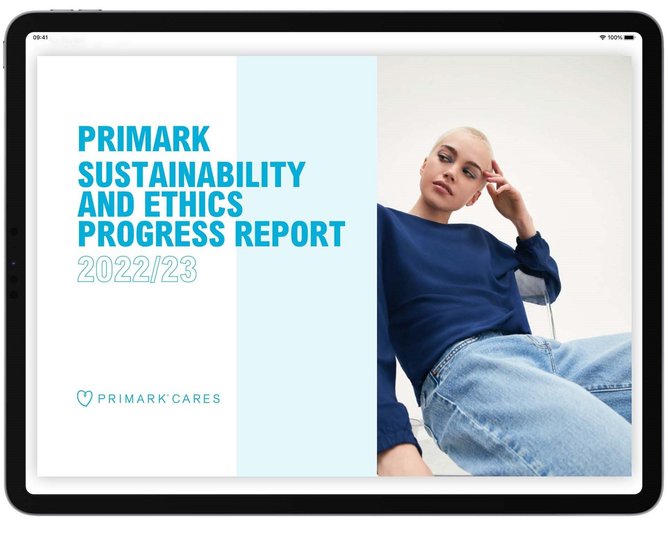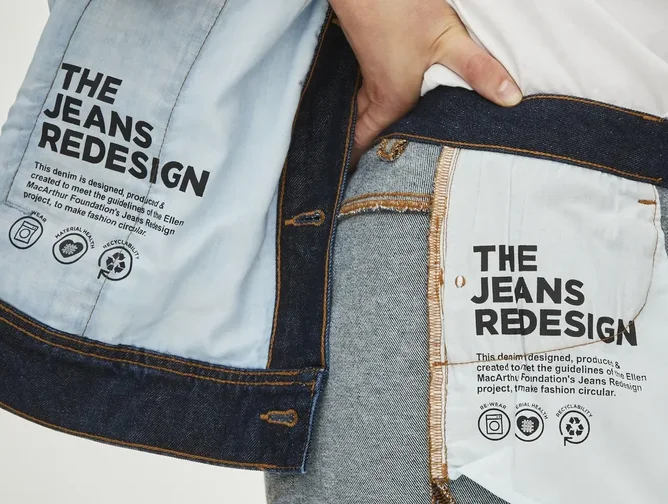Unpacking the Primark pledge to offer more sustainable style

Don’t be too quick to judge fast fashion.
While Primark isn’t the first brand that springs to mind when considering sustainable fashion, the Irish multinational has doubled down on environmental efforts in recent years.
With 432 stores located across 15 countries, more than 72,000 employees and revenue recently growing 15% to £9 billion, the value-focused retailer is reaching ever-greater milestones in its pledge to offer more sustainable, yet still affordable, fashion.
Primark now claims that more than half (55%) of the clothes it sold this year contained recycled or more sustainably sourced materials, up from 45% last year.
That’s according to its just-published ‘Sustainability and Ethics Progress Report’, which for the second year sets out the company’s progress across its Primark Cares commitments and further outlines its broader social impact and environmental sustainability work across its products, stores and the wider supply chain.

The report, which details Primark’s gains in scaling and embedding the principles, programmes and processes as part of its Primark Cares sustainability strategy, comes as the fashion retailer continues to be the main engine growth for parent company Associated British Foods – a diversified international food and retail group with sales of £13.9 billion (US$17.55 billion), 128,000 employees and operations in 53 countries.
Primark now accounts for just under half of total ABF group revenue and continues to grow, with 27 retail stores opening in the last year and ambitious plans to roll out 530 stores internationally in the next three years.
Discussing the retailer's second sustainability progress report, Lynne Walker, Director of Primark Cares, says: “We continue to work with our partners and suppliers to drive change, and we’ve learnt more than ever how collaboration is crucial for delivery of our Primark Cares commitments. We’ve also been focused on upskilling and training our colleagues, who are an integral part of how we make change happen in our business.”
“Another critical element is how we can inspire and educate our customers and bring them with us on our change journey. This includes being more transparent about where and how our clothes are made, the changes we are making and what it means for them, and the issues and what role the fashion industry and they, as customers, can play in this change.”
Changing the way clothes are made and sourced
Unveiled in 2021, Primark Cares is a strategy focused on changing the way clothes are made and sourced – with programmes and processes in place to halve carbon emissions across its entire value chain by 2030, reduce fashion waste, and improve lives of the people who make Primark products.
As well as committing to the transition of 100% of its clothing line to recycled or more sustainable materials by 2030, Primark aims to use only cotton that is either organic, recycled, or sourced from its award-winning Sustainable Cotton Programme (PSCP) by 2027.
Now running for a decade, and the largest such programme of its kind for a fashion retailer, PSCP had trained 160,000 farmers in more sustainable farming methods by the end of 2022 and in the 11 months since, has almost doubled that number to 300,000 – surpassing its target of 275,000 farmers by the end of 2023.
Add to this, Primark’s circular product range – which launched in April 2023 with a 35-piece collection based on principles established by the Ellen MacArthur Foundation – and you have a recipe for sustainability success.
The proof is in the numbers.
While 55% of all clothes sold by the retailer this year are now made from sustainable or recycled materials, up from 45% last year, nearly half (46%) now contain cotton that is either organic, recycled or sourced from the PSCP programme.
And more than three million units of circular clothing have now been sold.
The retailer has also rolled out a traceability and compliance platform with TrusTrace to bring together data from the full supply chain of products – from raw materials to finished product – so it can better understand and manage its supply chain.
In addition to ensuring all clothing is sourced sustainably, Primark is looking to strengthen the durability of its clothes by 2025 by significantly increasing testing, with denim collections wash-tested to a higher standard of 30 washes – and has further plans to eliminate single-use plastics and all of its non-clothing waste by 2027.
Among strategies, Primark will use cardboard display hangers in-store and work with suppliers to increase the recycled materials content in packaging.
They are also taking steps to tackle the problem of over-consumption in fashion retail, increasing in-store clothing repair workshops to 1,600 customers across the UK, Ireland, France and the Netherlands. These free beginners’ classes, both in-store and online via video, provide customers with skills to make items last longer, from replacing zips to adding buttons.

Halving carbon emission goals by 2030
Another significant milestone reached this year, Primark’s target of halving carbon emissions across its value chain by 2030 was assessed and validated by the Science Based Targets initiative (SBTi).
Given the majority of carbon emissions hail from the company’s supply chain, Primark has been focusing on supporting and encouraging suppliers in the switch to renewable energy sources – with steps taken in the last year to scale up its energy efficiency programmes across 57 factories in Bangladesh, China and Cambodia.
This is further strengthened with the appointment of regional carbon leads to support suppliers and factories locally.
Within its own operations, Primark has doubled down on reducing energy usage across its 408 stores globally, with nearly three-quarters (70%) of its 408 global stores now powered by renewable or low-carbon electricity and 141 having made the switch to energy-efficient lighting.
Read the full report here.
Primark – a history of value retail
Founded in Dublin, Ireland, in 1969 as a single shop under the Penneys brand with a vision to bring affordable fashion to consumers, Primark has rolled out this value ethos internationally in the five decades since, growing to 16 countries across Europe and the US, including Portugal, Spain, Germany, the Netherlands, Belgium, Austria, France, Italy, and the United States.
While the UK continues to be the retailer’s largest market with more than 190 stores, Primark has its sights set on continued expansion in the US – a market it entered in 2015. Currently home to 21 stores, plans are in place to have 60 stores in the country by the end of 2026.
While Primark’s sustainability strategy was unveiled in 2021, the company’s commitment to ethics stretches back to 2006, when they joined the Ethical Trading Initiative (ETi), a leading alliance of companies, trade unions, and NGOs that promote respect for workers’ rights around the globe.
*************************************************
For more insights into Sustainability - check out the latest edition of Sustainability Magazine and be sure to follow us on LinkedIn & Twitter
Other magazines that may be of interest - EV Magazine | Energy Digital
*********************************************
Sustainability LIVE Net Zero will be hosted live from the QEII Centre, London on the 6th and 7th of March, and streamed globally via our virtual event platform Brella. Sustainability LIVE Net Zero will delve deeper into the strategies, innovations, and collaborative efforts propelling us toward a net-zero future. The conference and exhibition gives the opportunity to connect with like-minded peers and actively contribute to crafting a sustainable future.
Following Sustainability LIVE Net Zero, viewers can also sign up for Sustainability LIVE Dubai, Singapore and New York.
Sign up to the The Global Sustainability & ESG Awards 2024, coming to London on the 10th September 2024.
*********************************************
BizClik is a global provider of B2B digital media platforms that cover 'Executive Communities' for CEO's, CFO's, CMO's, Sustainability Leaders, Procurement & Supply Chain Leaders, Technology & AI Leaders, Cyber Leaders, FinTech & InsurTech Leaders as well as covering industries such as Manufacturing, Mining, Energy, EV, Construction, Healthcare + Food & Drink.
BizClik, based in London, Dubai & New York offers services such as Content Creation, Advertising & Sponsorship Solutions, Webinars & Events.
- Is the UK Finally Going to Have a Deposit Return Scheme?Sustainability
- Vodafone Asks: Will Consumers Buy Refurbished Smartphones?Sustainability
- How eBay is Encouraging Refurbished Tech to Reduce E-wasteSustainability
- How Tapestry is Scaling Circularity Among its Luxury BrandsSustainability






